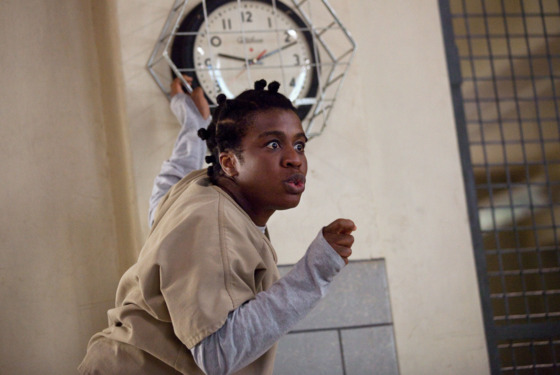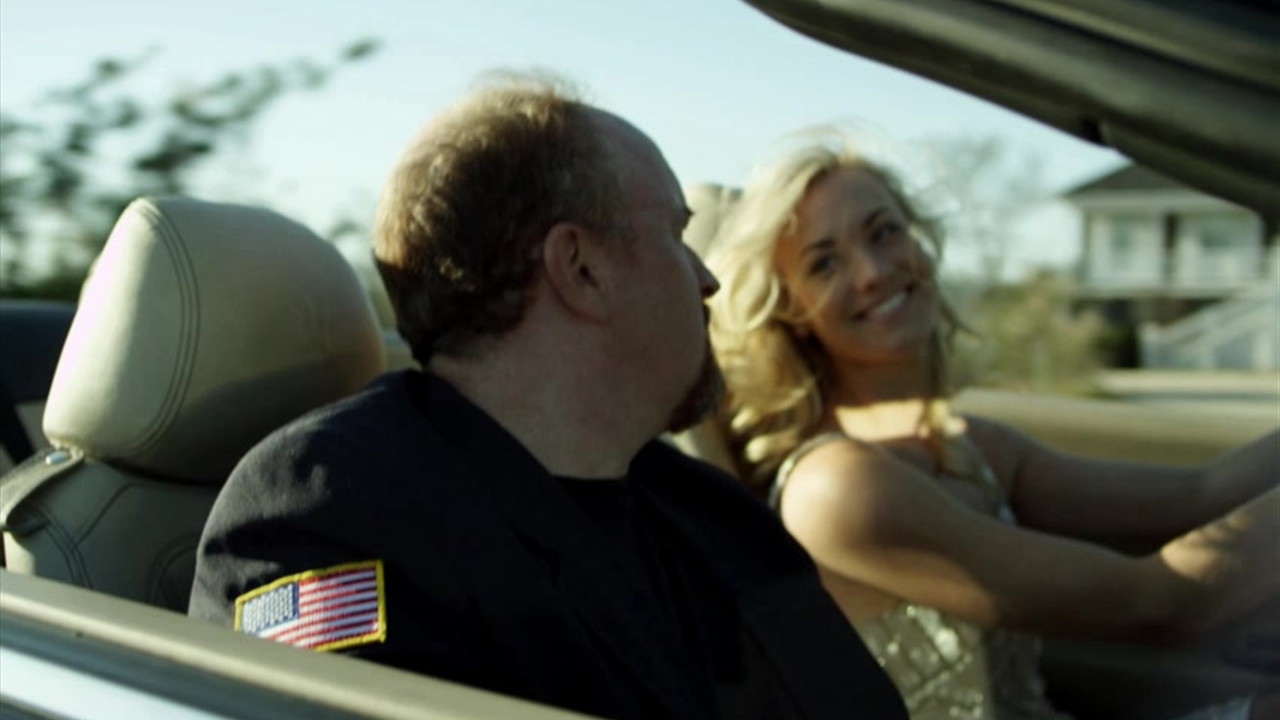How appropriate is it that these two episodes are getting lumped together in the review order? Both episodes deal with mental illness in such upfront but completely disparate ways - and yet, they're equally tragic. LET'S GET TO IT.
"Hugs Can Be Deceiving"

There are few Orange is the New Black characters I wanted to see a flashback more than Crazy Eyes Suzanne. Initially introduced to us as mentally unstable to a terrifying degree, the first season gradually tore her apart and revealed how she was just a troubled girl genuinely trying to do right at her core. This allowed the series to make some compelling points about mental illness, points that are made stronger than ever in "Hugs Can Be Deceiving", which finally answers some questions about Suzanne's past that have no doubt been nagging at all of you every night, even when you least expected them. The first, and most important - "what's with her white parents?". We soon learn that, no, this isn't a Louie thing. Suzanne was adopted, thought to be her parents' only shot at a child until they miraculously conceived her younger sister four years later. But to their credit, the birth of their new baby didn't influence them to push Suzanne out of the spotlight, despite her apparent mental health issues and her struggle to fit in with the often closed-minded, WASP-y life she was thrust into. No, it made them push harder. And while the show doesn't exactly demonize her parents for this, it demonstrates that even trying their best, they simply didn't have the resources or even the knowledge about how to deal with someone like Suzanne. Society, really, has no idea what the fuck to do with her, and that even boils down to the society of Litchfield, who relegates her to roles like "time keeper" to stop her from ruining Jenga again. It's a heartbreaking truth, one that comes to circle in the final flashback to Suzanne's past, when we see her getting stage fright at her high school graduation and running off the stage as her classmates snicker. Even the people who want to support Suzanne - whether it be her parents or her fellow inmates - simply just can't. But then...enter Vee, who at this point is mostly a pretty mysterious figure but is obviously someone who knows how to read people. Vee probably doesn't fully understand Suzanne, but she seems to understand that no one does, and she immediately uses that to con her way into Suzanne's trust. She may not completely understand why she's lonely, but she understands that she is, and she knows she can do something about it. And just as Taystee was lured in by Vee's promise of a family she never thought she could have, Suzanne is lured in by Vee's promise of being the only one who can at least kind of understand what's going on in her mind.
While this episode is clearly dominated by Suzanne, credit also has to be given to Piper, who makes her return to Litchfield in a way that seems to directly address the criticisms lured at her last season. This could all seem too cutesy or self-aware, but I've always felt the show
wants us to see Piper's shortcomings. So when Piper comes in as a seemingly changed woman who's had her heart hardened by the system, it feels genuine rather than a character reversal. This is especially evident when she's playing off of Soso, a young new inmate who shares many of the same fears and shortcomings that Piper had when she first entered Litchfield last season. Piper finally giving in and telling Soso to
shut the fuck up and get over it is perhaps the moment where she officially leaves her "deer in headlights" old self behind and officially becomes The New Piper. So who is The New Piper? We're not entirely sure yet, but if that speech calling out Soso's silly bullshit is any indication, it's someone who's going to be a hell of a lot of fun to watch.
"A Whole Other Hole"

If "Hugs Can Be Deceiving" shows us one end of the mental health spectrum, then "A Whole Other Hole" takes the complete opposite approach while still more or less having the same thesis statement. Suzanne's level of mental illness is immediately recognizable. It's completely overt, and while it's initially scary and potentially violent, its obviousness allows it to be dealt with in ways that don't fix the problem but at least allow the people in Suzanne's life to deal with it the best way they can. Someone like Suzanne is someone whose behavior strikes up all of the typical discussions about mental illness, the kind of person that you may very well think of when you hear those words. But "A Whole Other Hole" covers the other kind of mental illness - the covert one. That's the kind of mental illness where you may not even know the person is mentally ill. Hell, for most of Season 1, Morello seemed like one of the more well-adjusted inmates, someone who apparently had a light at the end of the tunnel that allowed her to get through her days with a pep in her step that many of the inmates didn't have. And then, in one traumatizing flashback and one incredibly misguided decision, that entire image comes crashing down in an instant.
It's an incredibly interesting counterpoint to Suzanne's brand of mental illness that makes what Orange is the New Black is saying about the topic all the more interesting. We see Suzanne's behavior and we immediately label her as crazy - hell, her nickname is Crazy Eyes. But Morello lives out her mental illness in ways that are less obvious but equally as harmful to her surroundings. She's created a delusional life for herself, a life that can completely escape her fellow inmates, her family members, and even herself. Suzanne's story tells us that treatment for the mentally ill often fails because no one knows how to deal with it - Morello's story tells us that treatment for the mentally ill often fails because no one even knows about it, at least not until it's already caused destruction. It's a bleak take on a complex issue, and Orange is the New Black knows it's not capable of giving the answers. But it's putting the question out there, in hopes that someone can, and that's damn admirable.
The other major plot thread of "A Whole Other Hole" also focuses on the dismantlement of something that was established in Season 1 - the Taystee and Poussey friendship. What I truly love about this season of Orange is the New Black is the way it takes everyone - even people who were mostly relegated to comedic background roles in Season 1 - and asks us to feel for them. Poussey was never much more than Taystee's sidekick in Season 1, but this episode opens her up in ways that I wasn't even sure was possible in Season 1. By revealing her desire for a relationship with the person who's most important to her life right now, we get a layer of complexity to Poussey's psyche that wasn't there before. And as with many of those other layers revealed to us this year, it's also revealed to Vee, who uses it to continue the wedge she's attempting to drive into the Litchfield ecosystem. Not only is this season of Orange is the New Black asking us to consider all of these peoples' feelings, it's also asking us to see how those feelings often send them directly into traps.
Oh, and Larry and Polly like each other or some shit. Who cares?






